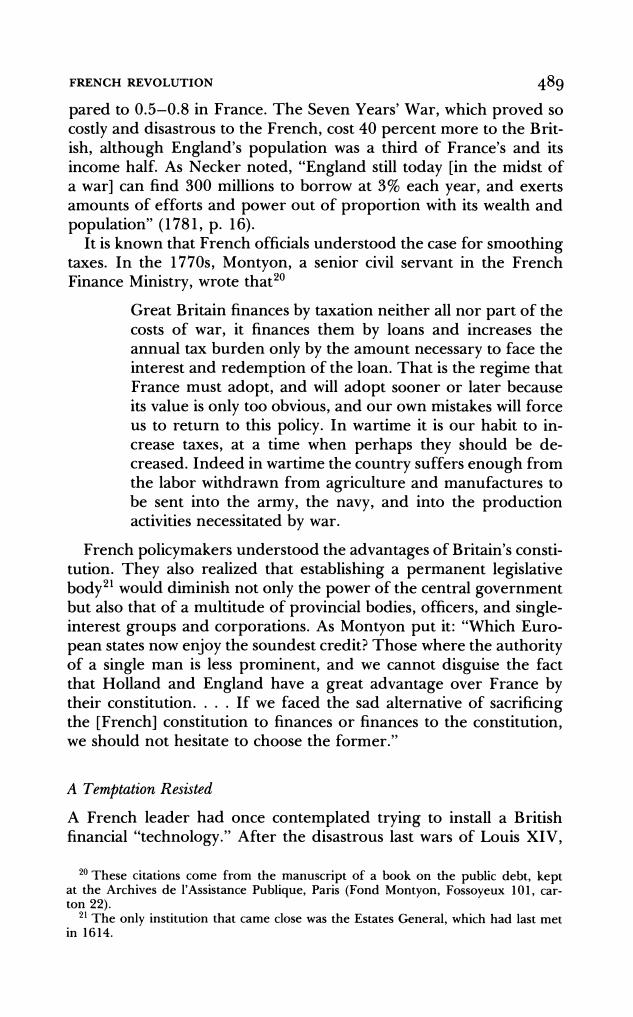正在加载图片...

FRENCH REVOLUTION 48g pared to 0.5-0.8 in France.The Seven Years'War,which proved so costly and disastrous to the French,cost 40 percent more to the Brit- ish,although England's population was a third of France's and its income half.As Necker noted,"England still today [in the midst of a war]can find 300 millions to borrow at 3%each year,and exerts amounts of efforts and power out of proportion with its wealth and population"(1781,p.16). It is known that French officials understood the case for smoothing taxes.In the 1770s,Montyon,a senior civil servant in the French Finance Ministry,wrote that20 Great Britain finances by taxation neither all nor part of the costs of war,it finances them by loans and increases the annual tax burden only by the amount necessary to face the interest and redemption of the loan.That is the regime that France must adopt,and will adopt sooner or later because its value is only too obvious,and our own mistakes will force us to return to this policy.In wartime it is our habit to in- crease taxes,at a time when perhaps they should be de- creased.Indeed in wartime the country suffers enough from the labor withdrawn from agriculture and manufactures to be sent into the army,the navy,and into the production activities necessitated by war. French policymakers understood the advantages of Britain's consti- tution.They also realized that establishing a permanent legislative body21 would diminish not only the power of the central government but also that of a multitude of provincial bodies,officers,and single- interest groups and corporations.As Montyon put it:"Which Euro- pean states now enjoy the soundest credit?Those where the authority of a single man is less prominent,and we cannot disguise the fact that Holland and England have a great advantage over France by their constitution....If we faced the sad alternative of sacrificing the [French]constitution to finances or finances to the constitution, we should not hesitate to choose the former." A Temptation Resisted A French leader had once contemplated trying to install a British financial "technology."After the disastrous last wars of Louis XIV, 20 These citations come from the manuscript of a book on the public debt,kept at the Archives de I'Assistance Publique,Paris(Fond Montyon,Fossoyeux 101,car- ton 22). 21 The only institution that came close was the Estates General,which had last met in1614.FRENCH REVOLUTION 489 pared to 0.5-0.8 in France. The Seven Years' War, which proved so costly and disastrous to the French, cost 40 percent more to the British, although England's population was a third of France's and its income half. As Necker noted, "England still today [in the midst of a war] can find 300 millions to borrow at 3% each year, and exerts amounts of efforts and power out of proportion with its wealth and population" (1781, p. 16). It is known that French officials understood the case for smoothing taxes. In the 1770s, Montyon, a senior civil servant in the French Finance Ministry, wrote that20 Great Britain finances by taxation neither all nor part of the costs of war, it finances them by loans and increases the annual tax burden only by the amount necessary to face the interest and redemption of the loan. That is the regime that France must adopt, and will adopt sooner or later because its value is only too obvious, and our own mistakes will force us to return to this policy. In wartime it is our habit to increase taxes, at a time when perhaps they should be decreased. Indeed in wartime the country suffers enough from the labor withdrawn from agriculture and manufactures to be sent into the army, the navy, and into the production activities necessitated by war. French policymakers understood the advantages of Britain's constitution. They also realized that establishing a permanent legislative body21 would diminish not only the power of the central government but also that of a multitude of provincial bodies, officers, and singleinterest groups and corporations. As Montyon put it: "Which European states now enjoy the soundest credit? Those where the authority of a single man is less prominent, and we cannot disguise the fact that Holland and England have a great advantage over France by their constitution.... If we faced the sad alternative of sacrificing the [French] constitution to finances or finances to the constitution, we should not hesitate to choose the former." A Temptation Resisted A French leader had once contemplated trying to install a British financial "technology." After the disastrous last wars of Louis XIV, 20 These citations come from the manuscript of a book on the public debt, kept at the Archives de l'Assistance Publique, Paris (Fond Montyon, Fossoyeux 101, carton 22). 21 The only institution that came close was the Estates General, which had last met in 1614